FusionMaps XT offers you a lot of options to format your numbers on the map.You can configure number prefixes & suffixes, decimal places, and scaling of numbers based on a pre-defined scale. In this section, we'll see the number formatting properties supported by FusionMaps XT and look into number scaling in the next section.
We'll start with setting decimal precisions for the numbers on map.
All the maps in FusionMaps XT support the decimals attribute. This single attribute lets you control the decimal precision of all the numbers on the map. Using this attribute, you can globally set the number of decimal places of ALL the numbers on the map. By default, the decimal precision of all the numbers on the map is set to 2. Using this attribute, you can re-define it. For e.g., if you have numbers on your map as 2.386 and 7.4, by default the numbers will be rounded off to 2 decimal places and the numbers will become 2.39 and 7.4. To display all the 3 decimals of the first number, you need to explicitly set <map ... decimals='3' >.
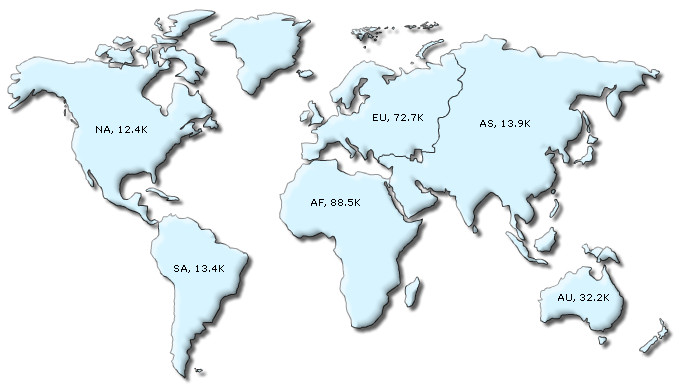 |
| Number formatting set to show up to 3 decimal places - hence none of the numbers are rounded off |
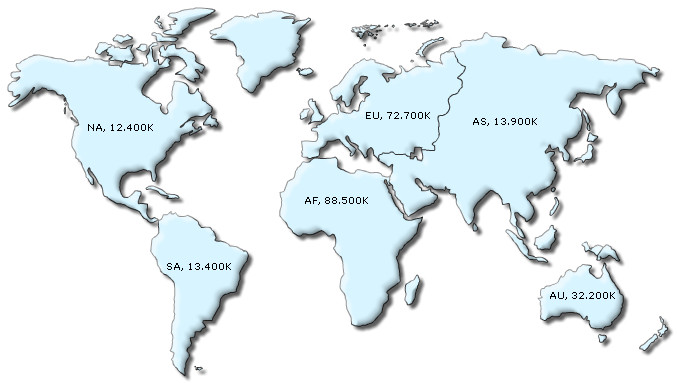
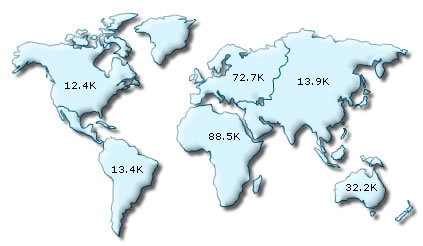 |
Number formatting applied - numbers converted using K |
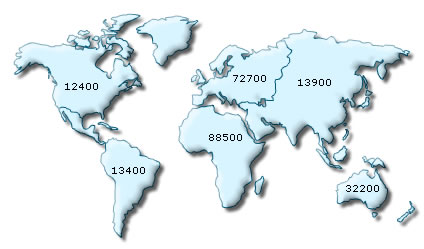
By default, FusionMaps XT uses . (dot) as decimal separator and , (comma) as thousand separator character. However, you can customize this character depending on your requirements.
To do so, use the decimalSeparator and thousandSeparator attribute. For example, let's set our thousands separator as dot and decimal separator as comma. To do so, you'll have to use the following XML:
<map ... decimalSeparator=',' thousandSeparator='.' >
Shown below is the output.
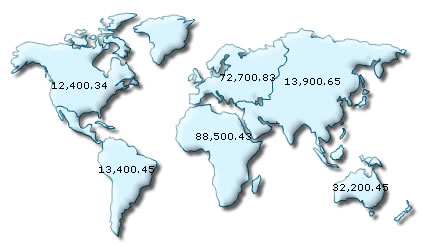 |
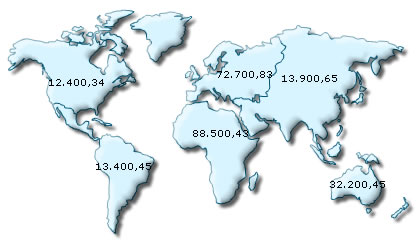 |
Using , as thousand separator and . as decimal separator (default) |
Using . as thousand separator and , as decimal separator |
FusionMaps XT automatically decides the position of the thousand separator. By default, the thousand separator is placed after every three digits from right. A map with default thousand separator position will look as under:
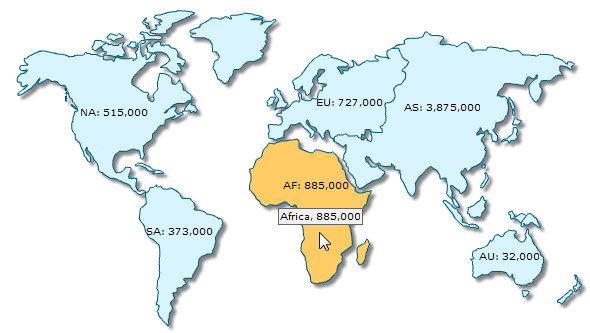
Starting FusionMaps XT, you can customize the position of the thousand separator and place it as required. To place the thousand separator in custom positions you need to use the thousandSeparatorPosition attribute. Shown below is a map with the thousand separator placed after four digits from right:
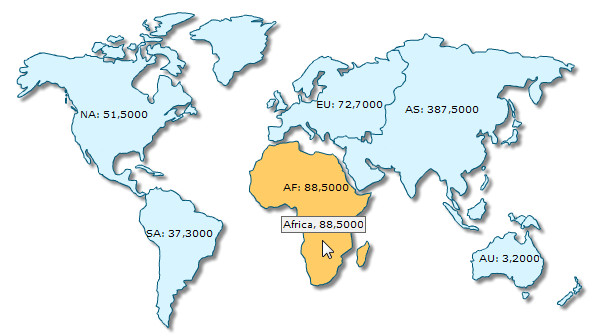
In the above map, the attribute thousandSeparatorPosition is set to '4'. So, the thousand separator (,) is placed after every four digits starting from right.
You can also set multiple values (separated by comma) to this attribute, instead of a single value. Thus, you can specify complex thousand separator positions. For example, specifying multiple values, you can display numbers in Indian currency format, where the first thousand separator (for thousand) is placed after three digits from right and then onwards the thousand separator is placed after every two digits. Shown below is an example map displaying Indian currency format:
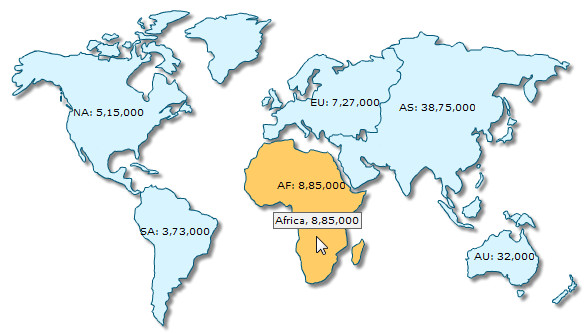
In the above map, we have set thousandSeparatorPosition='2,3'. So, the thousand separator is first placed after 3 digits starting from right and then onwards after every two digits. Given below are some sample combinations of values which can be set to this attribute:
| Value set | Description | Example |
| thousandSeparatorPosition="0" | When this attribute is set to 0, it takes the default value, which is 3, and places the separator after every three digits starting from right.
Rule: When zero is specified as the thousand separator position, it assumes the default value, which is 3. |
1,344,317,518 |
| thousandSeparatorPosition="2" | When this attribute is set to 2, the thousand separator is placed after every two digits starting from right. | 13,44,31,75,18 |
| thousandSeparatorPosition="4" | When this attribute is set to 4, the thousand separator is placed after every four digits starting from right. | 13,4431,7518 |
| thousandSeparatorPosition="1,2" | In this case, first the thousand separator is placed after two digits from right. Then onwards the separator will be placed after every digit. | 1,3,4,4,3,1,7,5,18 |
| thousandSeparatorPosition="1,2,3" | In this scenario, first the separator will be placed after three digits from right, then the separator will be placed after two digits and then onwards it will be placed after every digit. | 1,3,4,4,3,17,518 |
| thousandSeparatorPosition="3,1,0" | In this scenario, the value 0 will be replaced by the default value 3. So, the thousand separator will be first placed after three digits from right. Then the separator is placed after one digit. Then onwards it will be placed after every three digits.
Rule: When zero is specified as the first thousand separator position in a comma separated list of thousand separator positions, it assumes the default value, which is 3. |
134,431,7,518 |
| thousandSeparatorPosition="1,0,2" | This is a special case where 0 is used as the second value. In this scenario, first the thousand separator is placed after two digits. Next, the value 0 assumes the previous value, which is 2. Hence, the separator will again be placed after two digits and then onwards it will be placed after every digit.
Rule: When zero is specified NOT as the first thousand separator position in a comma separated list of thousand separator positions, it assumes the previous value from the list. |
1,3,4,4,3,1,75,18 |
| thousandSeparatorPosition="0,1,3" | In this scenario, first the thousand separator is placed after three digits. Then it is placed after every digit. Now, the value 0 assumes the previous value, 1 and rest of the separators are placed after every digit.
Rule: When zero is specified NOT as the first thousand separator position in a comma separated list of thousand separator positions, it assumes the previous value from the list. |
1,3,4,4,3,1,7,518 |
FusionMaps XT allows you to add a prefix or suffix to all the numbers on the map. You can use the following attributes of the <map> element to attain the same:
- numberPrefix="$" : Using this attribute, you could add prefix to all the numbers visible on the graph. For example, to represent all dollar figures on the map, you could specify this attribute to ' $' to show like $40000, $50000.
- numberSuffix="p.a" : Using this attribute, you could add suffix to all the numbers visible on the graph. For example, to represent all figure quantified as per annum on the map, you could specify this attribute to ' /a' to show like 40000/a, 50000/a.
To know more on how to use currency symbols (£, €, ¥ etc.) refer to Using Currency Symbols page. If you intended to use special punctuation or characters like &, <, >, % etc. refer to Using Special Punctuation page.
In Data URL method, you can directly specify the character.
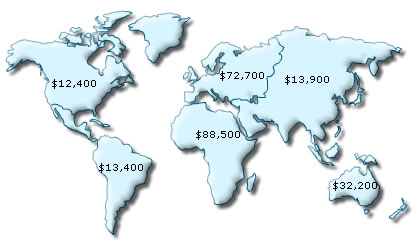 |
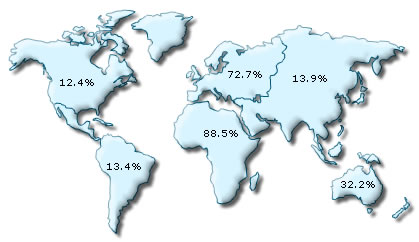 |
$ set as number prefix |
% set as number suffix |